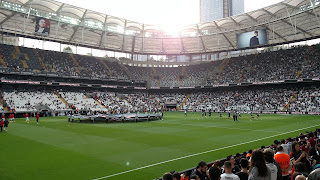Last
time I was in Athens, two years ago, there were no games to see, so this time
around I was happy to see that the season wasn’t all over yet. The Superleague
Greece (First Division) was in the play-off stages, with the game between the
big teams from Athens and Thessaloniki mired by violence. As I have seen all
the major teams of Athens already more than two decades ago, I decided to go
and see a game in the Football League (Second Division). My Dutch friend WL,
who has lived in Athens for decades, went with me, which was not just good for
company but also for directions – turned out that the bus line we needed had
been discontinued a year ago. So, after two different buses, and an almost
one-hour travel to the outskirts of Athens, we arrived in a very sleepy suburb
of Acharnes, where the effects of the economic crisis are much more visible
than in the heart of Athens.
Athlitikos Omilos
Neos Acharnaikos was created in
1938, but only founded in 1959 – I also don’t know why. Until 1961 they were
known as Yperochi
Menidi – Menidi is another name for Acharnes. Their colors are green and white and their logo is
a four-leaf clover, which makes them look very similar to Athens powerhouse
Panathinaikos – although they are not officially connected. Until the 1990s
they played in local divisions of Athens.
After a cup of coffee in a far too modern café
close by, we return to the stadium, where we buy tickets (€5) for the main stand, which turns out to be the only of two stands
open today. Fortunately it is covered, as it looks like the rain will return
during the game.
Acharnes
Stadium is an old concrete stadium in a residential area, probably from the
1950s, which has seen little investment since its opening. It has a capacity of
4,450, but today there are barely 250. Only some 5 percent are women, rest
mostly older, local men. No one had the made the almost 300 km (180 miles)
track from Karditsa in the North of Greece.
The
weather has been terrible all day, i.e. cold, grey and rainy, and the pitch is
in a horrible state. This doesn’t help the already limited players:both teams
are on the lower end of the table. The pace of the game is low, the control
poor, and the passing cautious. And then, out of nowhere, in the 8th
minute, the hosts shoot from 25 meters and the goalie completely misses the
ball: 1-0. I start to wonder about the Chinese gambling mafia.
In
the 11th minute a free kick of Acharnaikos goes nowhere. Fifteen minutes later a
good attack by the hosts is shot at the goalie from close range. Another ten
minutes passes in which little happens and most of the audience remains
low-key, mostly passing time by talking with each other.
In the 35th
minute an Anagennisi corner is missed by everyone and a minute later their free
kick is headed well over. In the 38th minute two players get injured
and stay on the ground for a while. Then the official clock is moved to 45
minutes and it turns out it was running 8 minutes slow. Half time: 1-0.
The
second half continues where the first half left off: slow pace, poor control,
cautious passing. In the 53rd minute Anagennisi has two attacks, one is headed out by the
hosts, and in the rebound a visitor volleys the leg of an Acharnaikos player
rather than the ball. Overall, the game is full of injuries, which makes it
even slower.
The visitors
are pressuring, as the hosts mainly defend. Anagennisi mainly pumps in crosses,
which are (easily) headed out by the Acharnaikos defenders. At one attack the
home goalie almost fumbles, at another he tips the ball over the goal. In the
66th minute Anagennisi has another attack, this time ending in a low
and slow shot, which is saved by the goalie. In the 75th minute the
guests finally score; once again the attack is over left and this time it s
finished in the right corner: 1-1, which is also the final score.
Acharnaikos
is a great destination for an adventurous groundhopper, but might not be worth
the trouble for the average football fan. I’m just happy WL went with me and
didn’t even complain!



















